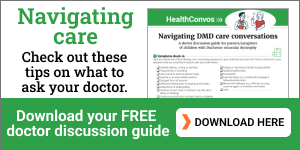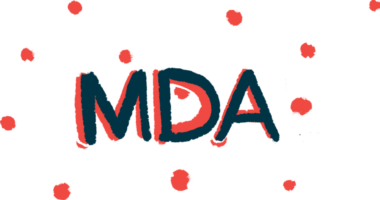 Discussion
Discussion
Your DMD community: Resources and support
While Duchenne muscular dystrophy (DMD) is one of the most common types of this group of muscle-wasting disorders, affecting about 1 in 3,500 male births, each patient’s journey with this form of muscular dystrophy (MD) will be unique. Multiple resources and support services are available to help the DMD community and those with associated disorders navigate management of their condition, ranging from disease education to financial assistance.
The disorder is caused by mutations in the DMD gene, which instructs cells on how to produce the protein dystrophin, which helps to protect muscle cells from movement-related wear and tear. While thousands of various disease-causing mutations have been identified in the DMD gene, most mutations that cause the disorder result in the lack of functional dystrophin protein production.
Learning more about an individual’s particular diagnosis and prognosis can help the patient, and potentially any caregivers or family members, to better manage the disease — and achieve the best possible quality of life. DMD support groups, both in person and virtual, can provide valuable information about living with DMD and connect patients with others who may be facing similar challenges. Medical and financial resources may help in improving care, finding research opportunities to get involved in, and getting help with unexpected expenses.
Support groups
It is important for people with rare diseases such as Duchenne to be able to communicate both with experts and other patients and caregivers about their daily challenges. Finding a supportive community helps patients and their families know they don’t have to deal with a DMD diagnosis alone, but can connect with others, locally and globally, in person and online.
Many of the following organizations offer a variety of services and resources to people affected by MD, and specifically Duchenne.
- CureDuchenne is a nonprofit offering myriad support to Duchenne families, including patients who are newly diagnosed, as well as information on topics related to finding and building a supportive community. The organization also offers one-on-one meetings with DMD parents for personalized assistance with resources and programming.
- The Muscular Dystrophy Association, known as the MDA, offers information about Duchenne as well as a resource list for families — on topics such as accessible travel, child education, and clinical trials — and support programs to help patients navigate their journey. A clinical trial finder also is offered by this nonprofit.
- Jar of Hope provides assistance to DMD patients and their families, raising funds for better treatments, and also supports researchers and clinicians working to eliminate Duchenne and find a cure.
- Parent Project Muscular Dystrophy, or PPMD, offers a community resource center with daily living resources, plus local peer support groups throughout the country. Individuals with DMD also can take part in The Duchenne Registry, a database that shares anonymous patient data with researchers.
- The Jett Foundation seeks to boost DMD awareness and offers community programming, education, support, and research information.
- The Caregiver Action Network, a family caregiver organization, works to improve the quality of life for the approximately 90 million people in the U.S. who care for a loved one with a disability or in need, to include patients with Duchenne. The group marks National Family Caregivers Month each November with varying activities.
- The Sibling Support Project is a national program that seeks to support the brothers and sisters of those with special health concerns. The program’s sibshops in various states offer events where siblings can have fun and learn more about the services needed by people with Duchenne and other disorders.
- Action Duchenne, based in the U.K., offers support for new patients and their siblings, and resources for schools and teachers. The group offers an Action Duchenne International Conference each year.
- The Duchenne Family Support Group is a U.K.-based initiative by Muscular Dystrophy UK that provides support to Duchenne families through a vast network of parents and professionals. Individuals can come together for mutual support, social activities, and to share information and experiences.
Online support
Between a lingering pandemic and disease symptoms that affect mobility, people with DMD may not always get around outside as easily as they would like. To offset such challenges, online resources are available.
- This publication, Muscular Dystrophy News Today, has a forum available for people with MD, including subforums dedicated to topics such as mental health and positivity and mobility aids and medical equipment.
- DuchenneXchange is an online community platform where patients, families, providers, scientists, and treatment developers can come together to engage, explore, and learn.
- Genetics Home Reference is an online resource from the National Institutes of Health that offers easy-to-understand information on genetic conditions and how genes work.
- Duchenne.com is a website offering resources and support to the DMD community. It bills itself as a platform for and by people with Duchenne.
Support for people with disabilities
Resources with a broader scope also are available for people who have disabilities in general. Among them:
- Disability.gov, a U.S. Department of Labor website, has information and resources to help individuals with disabilities lead full lives that are as independent as possible.
- The Centers for Independent Living are private, nonprofit agencies that offer services aimed at maximizing the independence of those with disabilities.
- The Patient Advocate Foundation, which offers information in English and Spanish on its website, provides professional case management services to those who face chronic and debilitating conditions.
Healthcare
Various resources can help DMD patients and their families learn about treatments and how to access them. Many are offered by pharmaceutical companies or by nonprofits. Some may even offer resources that can help patients connect with doctors and specialists.
- NS Pharma, developer of the DMD therapy Viltepso (viltolarsen), opened a support hub in 2020 to help Duchenne patients access treatments. Aimed at patients and their healthcare providers, the hub provides patients and clinicians with information about the availability of Viltepso and program enrollment.
- The MDA has a Gene Therapy Support Network that provides guidance and resources about gene therapies for individuals with neuromuscular diseases such as DMD. In June 2023, the U.S. Food and Drug Administration granted accelerated approval to Sarepta Therapeutics’ Elevidys, making it the first gene therapy approved for DMD.
- For patients who use the PTC Therapeutics treatment Emflaza (deflazacort), educational and financial support are available through PTC Cares, which can be accessed online or by phone.
- SareptAssist, a similar program, is available online or by phone to those on Sarepta therapies, namely Vyondys 53 (golodirsen), Exondys 51 (eteplirsen), Amondys 45 (casimersen), and the recently approved Elevidys.
- The Certified Duchenne Care Center Program, from PPMD, aims to ensure that all DMD patients receive comprehensive quality care. U.S. centers in the program must meet the highest possible standards in clinical and sub-specialty services.
- PPMD also offers the Decode Duchenne program, which provides no-cost genetic testing, interpretation, and counseling to those with Duchenne or Becker muscular dystrophy. Such testing can confirm a diagnosis or help individuals determine if they might be disease carriers.
- The MDA’s Care Center Network, affiliated with more than 150 medical centers across the nation, provides expert care to people with neuromuscular diseases including Duchenne.
- ChildMuscleWeakness.org provides tools and information to help parents and healthcare professionals spot early indications of muscle weakness and neuromuscular disease.
- Parent to Parent USA provides support for families with children who have a special healthcare need or disability, focusing on connecting parents with others in similar circumstances.
Financial support
Families affected by DMD commonly face financial problems stemming from the disease, and often have to deal with critical needs or unexpected expenses. The following resources may be able to help.
- The Duchenne Family Assistance Program offers funds to help with certain challenges, which can include the need for vehicle conversions, home modifications, and/or wheelchairs. The sole requirement for obtaining funds is proof of a DMD diagnosis.
- State Pharmacy Assistance Programs, available in many states, help eligible individuals pay for prescription medications.
- The PPMD offers access to insurance coverage resources for new treatments, as well as its own roadmap to help patients navigate the process.
- The Assistance Fund helps provide financial relief to families dealing with high out-of-pocket expenses in more than 80 diseases and disorders.
- The Muscular Dystrophy Family Foundation helps people with neuromuscular diseases by providing, for example, adaptive equipment, home modifications, and vehicle lifts or other conversion assistance.
- Route 79, the Duchenne Scholarship Program is sponsored by Sarepta and offers financial assistance to help DMD patients achieve post-high school educational goals. The scholarship takes it moniker from the 79 exons in the dystrophin gene that are affected in DMD.
- Team Joseph funds Duchenne research and supports patients in need of immediate assistance or medical equipment. The nonprofit aims to help those caring for a person with Duchenne.
- The Akari Foundation, which offers information on its website in English and Spanish, seeks to educate, empower, and advocate on behalf of the Hispanic immigrant community, with a focus on rare diseases such as Duchenne.
Educational resources
Special educational resources can help families affected by DMD and related conditions to better understand MD and how to manage it.
- CureDuchenne Cares is an interactive education and outreach program from CureDuchenne that aims to provide the DMD community with information, resources, and best practices for managing the disorder.
- The MDA’s Community Education program seeks to empower the neuromuscular disease community through educational programming and materials. The organization also offers Access Workshops, a community education program established to provide information and resources about the availability of medical care, employment, equipment, financial independence, etc. There also are on demand webinars available, including last year’s MDA Engage: DMD Symposium.
Medical information
Additional medical and scientific resources can help inform patients’ care and offer opportunities to get involved in research.
- Muscular Dystrophy News Today provides news on the latest developments in the research field of muscular dystrophy, as well as useful information about the disease, its causes, symptoms, and available and experimental treatments.
- The PPMD’s Duchenne Registry is a central hub that brings together patients, their families, caregivers, and friends, and connects them with clinical care and trials, as well as medical research.
- The National Institutes of Health’s ClinicalTrials.gov website lists several clinical trials for Duchenne; the site can be checked for the latest in treatment development and enrollment opportunities.
- Duchenne Map offers Duchenne research, healthcare, and clinical trial information all in one place to help patients structure their healthcare journey.
Muscular Dystrophy News Today is strictly a news and information website about the disease. It does not provide medical advice, diagnosis or treatment. This content is not intended to be a substitute for professional medical advice, diagnosis, or treatment. Always seek the advice of your physician or other qualified health provider with any questions you may have regarding a medical condition. Never disregard professional medical advice or delay in seeking it because of something you have read on this website.
Recent Posts
- How AI can support my daily life with Duchenne muscular dystrophy
- Ahead of this year’s MDA Conference, association’s CEO speaks of ‘hope’
- A blind date with a book encourages me to dust off my social life
- New research reveals protein pathway that can slow muscle repair
- Dreaming of solutions to the Olympic-sized challenges of FSHD
-
 Discussion
Discussion
-
-
 Fact-checked by
Fact-checked by 




